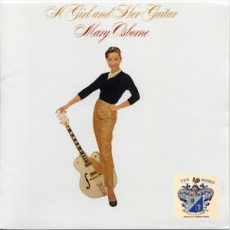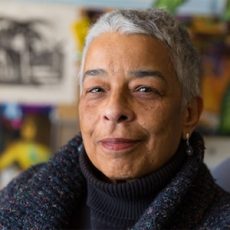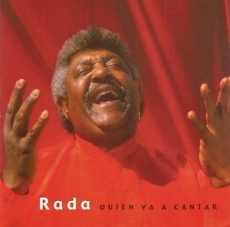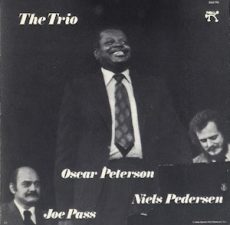
Daily Dose Of Jazz…
Mary Osborne was born in Minot, North Dakota on July 17, 1921 into a musical family. As early as age three she showed an interest in music with her earliest instruments including piano, ukulele, violin, and banjo. At nine, she picked up the guitar. At ten, she started playing banjo in her father’s ragtime band. She was featured on her own radio program, performing twice weekly until she was fifteen. At twelve she started her own trio of girls to perform country music in Bismarck, North Dakota.
By the time she turned fifteen, Osborne joined a trio led by pianist Winifred McDonnell, for which she played guitar, double bass, and sang. After hearing Charlie Christian play electric guitar she immediately bought her own electric guitar and had a friend build an amplifier. She sat in with Christian to learn his style of guitar. Her husband and trumpeter Ralph Scaffidi encouraged her musical career.
The early 1940s saw Mary sitting in on jam sessions on 52nd Street, on the road with jazz violinist Joe Venuti and working freelance in Chicago, Illinois when she made a recording with Stuff Smith. In 1945, Osborne headlined a performance with Dizzy Gillespie, Art Tatum, Coleman Hawkins, and Thelonious Monk in Philadelphia, Pennsylvania to reviews and audiences that praised her specifically. She, Tatum, and Hawkins went on to record a concert in New Orleans.
Returning to New York City she recorded with Mary Lou Williams in 1945, Coleman Hawkins, Mercer Ellington, and Beryl Booker in 1946, and led her own swing trio. For three years her trio played 52nd street clubs, had a year-long engagement at Kelly’s Stables, and made several recordings. Throughout the 1950s, she played with Elliot Lawrence’s Quartet on The Jack Sterling Show, and appeared on the television show Arthur Godfrey’s Talent Scouts.
By the Sixties her focus changed to learning Spanish classical guitar under Alberto Valdez-Blaine and incorporated pick-less playing into her jazz playing. Osborne moved to Bakersfield, California, where she lived the rest of her life, and founded the Osborne Guitar Company with her husband. Mary taught music and continued to play jazz locally and in Los Angeles, California as well as several jazz festivals over the next two decades.
Guitarist Mary Osborne died on March 4, 1992 at the age of 70, the result of chronic leukemia.
More Posts: bandleader,guitar,history,instrumental,jazz,music

Jazz Poems
C.T.’S VARIATION
some springs the mississippi rose up so high
that sound of jazz from back
boarded shanties by railroad tracks
visionary women letting pigeons loose
on unsettled skies
was drowned by the quiet ballad of natural disaster
some springs song was sweeter even so
sudden cracks split in the sky / for only a second
lighting us in a kind of laughter
as we rolled around quilted histories
extended our arms and cries to the rain
that kept us soft together
some springs the mississippi rose up so high
it drowned the sound of singing and escape
church sisters prayed and rinsed
the brown dinge tinting linens
thanked the trees for breeze
and the greenness sticking to the windows
the sound of jazz from back
boarded shanties by railroad tracks
visionary women letting pigeons loose
on unsettled skies
some springs song was sweeter even so
THULANI DAVIS
from Jazz Poems ~ Selected and Edited by Kevin Young

Daily Dose Of Jazz…
Omar Ruben Rada Silva was born July 16, 1943 in Montevideo, Uruguay. Little is known about his early life but his sound comes from his exposure to the music of his country, a chorus of tamboriles and Uruguayan barrel drums.
In 1965, he and Eduardo Mateo formed the band El Kinto Conjunto. This was the first group in Uruguay to create the beat genre in Spanish and to fuse rock with Latin American musical styles. In 1969 the success of his Candombe song Las Manzanas (The Apples) led to his first solo album and participation in the Festival of Popular Music in Rio de Janeiro, Brazil. A year later he formed the band Tótem.
In 1977, he traveled to the United States after an invitation by the Fattoruso Brothers to play with the group OPA. Over the next year, he performed with Tom Scott, Ray Barretto, Hermeto Pascoal, and Flora Purim.
Settling in Mexico for three years beginning in 1991, Rubén worked as a composer and arranger for local musicians such as Mijares, Eugenia León, Stephanie Salas, and Tania Libertad. In 1994 he shared the spotlight with Sting and UB40 at the Palacio de Deportes in Mexico City.
Rada’s renown led him to record on international labels and his songs have been played worldwide and have been recorded by Milton Nascimento, Herb Alpert, and Lani Hall. He was invited by Jon Anderson and Joan Manuel Serrat to appear on their albums Deseo and Utopía, respectively.
He has voiced the part of Lucius Best/Frozone in the 2004 Argentinian dubbing of The Incredibles. Ruben has directed radio and TV shows, and has starred in the television sitcom La Oveja Negra (The Black Sheep).In 2010, the third round of the series LifeLines in Berlin paid tribute to Rubén Rada. That same year he recorded a show in the Argentine program Encuentro en El Estudio, which is run by that country’s Ministry of Education.
Percussionist, composer, singer and television personality Ruben Rada, who has recorded more than thirty albums, continues to perform, compose and record.
More Posts: bandleader,composer,history,instrumental,jazz,music,percussion,vocal

Daily Dose Of Jazz…
Graham Peter Hall, generally known as GP Hall was born July 15, 1943 in Hampton Hill, London, UK. Schooled in classical, flamenco and jazz, he went on to develop his skills as a guitarist in the British blues boom of the late 1960s. As a teenager, he played in the Odd Lot Band and set up the Odd Lot Club as a venue for their music, which in turn attracted more established bands and players for concerts.
As he became better known, Hall went on to play at more celebrated London venues including The Roundhouse, the Middle Earth club and took up residency at the 100 Club. He supported the likes of Deep Purple, The Hollies, and Chris Farlowe and played on stage with original American blues heroes John Lee Hooker and Sonny Boy Williamson.
In the early 1970s he studied with renowned flamenco guitarist Manitas de Plata and subsequently became involved in more avant-garde work, writing, producing and performing. GP was commissioned by the South Hill Park Arts Centre to write The Estates which was a large and complex musical piece. Scored for a large ensemble, it was recorded and released on album by Prototype Records in 1972. It was his debut recording.
At around this time, Hall’s promising career was cut short by personal trauma. This led to alcoholism, depression, periods of homelessness, loss of confidence and self worth. It would be more than a decade before he returned to music. During the 1980s he began returning to music but it was a slow process to becoming sober.
He would go on to compose, record and release seventeen albums to various labels as well as his own self-releases over the next thirty-three years. His last self-released album in 2019 is titled Be Strong. Guitarist, composer and improviser GP Hall continues to explore the realms of music.
More Posts: bandleader,composer,guitar,history,improviser,instrumental,jazz,music

Requisites
The Trio ~ The Oscar Peterson Trio | By Eddie Carter
This morning’s record from the library is a live album featuring three jazz giants. The Trio (Pablo Records 2310 701) is aptly named because it captures Oscar Peterson on piano, Joe Pass on guitar, and Niels-Henning Ørsted Pedersen on bass in performance during three nights at the Chicago jazz club, London House. What makes this album unique is the exceptional chemistry between each musician. Oscar Peterson’s virtuosic piano playing, Joe Pass’s innovative guitar techniques, and Niels-Henning Ørsted Pedersen’s melodic bass lines all shine through in this album. My copy is the 1973 U.S. Stereo release.
Side One starts with the first of two tunes by Oscar Peterson. Blues Etude begins at a brisk clip, with Joe and Niels-Henning firing on all cylinders before Oscar joins them for the melody. Oscar reveals his broad range in the song’s only solo, enhanced by Joe and Niels-Henning’s accompaniment. Chicago Blues is a delicious dish of soul food beginning with a lengthy piano introduction ahead of the trio’s slow-paced melody. Oscar opens with a tasty invitation for everyone to come to the table. Joe takes charge with a delicious second course next. Oscar adds another scrumptious dish to the meal, and then Niels-Henning provides the final course with a succulent solo preceding a luscious ending.
Side Two opens with Easy Listening Blues by Nadine Robinson. The trio gets things started with a polite melody. Oscar begins the song’s only solo with a warm caress of the keys, creating a beautiful musical landscape. Meanwhile, Joe and Niels-Henning tail him closely until the theme’s restatement and conclusion. Come Sunday is a beautiful jazz standard by Duke Ellington that becomes the sole showcase of Joe Pass. The guitarist approaches the theme and song’s only solo with a simple directness, resulting in a wonderful expression of incredible beauty culminating with a tender ending and appreciative applause from the audience.
Secret Love by Sammy Fain and Paul Francis Webster is a lively tune that will have you tapping your toes from the trio’s opening ensemble. Oscar is up first with a happy groove that makes a lasting impression on the listener. Joe steps up next and gives a splendid statement; then Oscar adds a few final comments ahead of the theme’s reprise and the audience’s approval. Norman Granz produced The Trio, and it’s unknown who supervised the live recording. However, the album’s sound quality is excellent with a soundstage that transports the listener to the London House audience as the trio is performing.
If you’re discovering the music of Oscar Peterson and are in the mood for a live album where you become part of the live audience at the London House. I invite you to check out The Trio by The Oscar Peterson Trio the next time you visit your favorite record store. It’s a fantastic album that captures three of the most renowned musicians at the top of their game. The Trio is a title highly recommended for a spot in your library, as it not only showcases the individual brilliance of each musician but also their exceptional chemistry, making it a must-have for any jazz enthusiast!
~ Come Sunday – Source: JazzStandards.com
~ Secret Love – Source: Wikipedia.org
© 2024 by Edward Thomas Carter
More Posts: bass,choice,classic,collectible,collector,guitar,history,instrumental,jazz,music,piano




